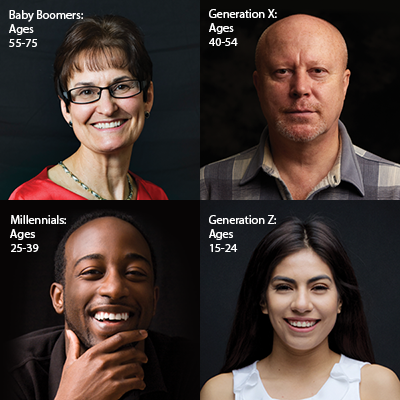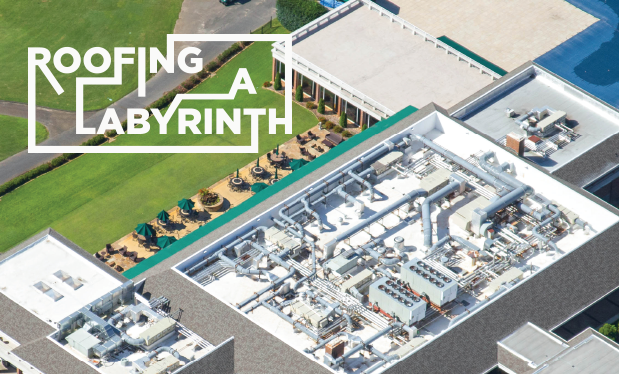More than one in three U.S. workers (35 percent) are Millennials, making them the largest generation in the U.S. labor force. And with Baby Boomers reaching retirement age at a rate of 10,000 per day, that number is climbing sharply across all businesses. By 2025, 75 percent of the global workforce is expected to be composed of Millennials, according to The Brookings Institution, a nonprofit public policy organization based in Washington, D.C.
As of 2017, the most recent year for which data are available, 56 million Millennials were working or looking for work. That was more than the 53 million Generation Xers, and well ahead of the 41 million Baby Boomers, according to Pew Research Center, Washington, D.C.
And according to the Bureau of Labor Statistics, the construction industry's workforce is aging faster than any other U.S. industry. For a growing number of roofing businesses, the problem is expected to worsen as increasing numbers of aging workers leave the industry and take their knowledge and skills with them. Some estimates by Facilitiesnet predict a shortage of 31 million skilled tradespeople by 2020, much of it through natural attrition as increasing numbers of Baby Boomers exit the workforce.
Finding younger generations to fill these shortages continues to prove difficult. More than 1 million construction jobs have been lost during the past 10 years, according to Forbes, and though the greater economy has rebounded since the Great Recession, the construction industry's numbers have not recovered at the same pace.
This means your business will have to find new ways to stay relevant, attract quality employees and retain top performers in addition to offering standard perks and competitive pay.
Stereotypes debunked
Entitled, lazy, narcissistic and addicted to social media—these are just some of the common misconceptions about Millennials.
As such, there has been a lot of speculation about what Millennials have to offer the workforce, but the truth is though many believe they understand the Millennial generation, the facts don't support these stereotypical opinions.
Myth: Millennials want constant praise.
In a recent IBM study, most Millennials claim to want a fair, ethical, transparent, consistent and dependable boss.
Only 29 percent said they wanted praise for their accomplishments.
Myth: Millennials feel entitled.
There is no clear evidence to support the notion Millennials feel entitled to opportunities and promotions, according
to The Millennial Myth by Crystal Kadakia. They just view their career options and traditional 9-to-5 jobs
differently than other generations, and those differing views easily can be mistaken as entitlement. The book goes on
to say that Millennials also are more willing to speak up for themselves and express their opinions, even to their
superiors, than their elders. They are not afraid to ask for more flexibility, a promotion or to take the risk to
move on when necessary.
Myth: Millennials are obsessed with technology.
Millennials grew up with technology, so it's only natural technology is a major part of their lives. Millennials are
adept at interacting online, but this doesn't mean they want to do everything virtually. When it comes to acquiring
new work-related knowledge and skills, for example, almost 40 percent prefer face-to-face contact, according to an
executive report from IBM Talent and Change Services.
Myth: Millennials are lazy.
Millennials may approach work differently, but characterizing them as lazy doesn't provide a clear picture. This
generation lives by the motto "work smarter—not harder." They deplore inefficiency and bureaucracy and
constantly are looking for ways to do more in less time. This fresh look is not a bad thing; it can even help to
improve business processes and boost overall production.
Myth: Millennials lack social etiquette.
Millennials grew up with social media and know more than any other generation in the workforce the dangers of
blurring the lines between personal and professional lives. They are better at setting these boundaries than Gen Xers
before them.
These unproven myths about Millennials should be shed, and roofing industry employers should embrace Millennials for being talented, ambitious and efficient workers. Millennials want to learn and contribute in meaningful ways; understanding the vital role they play in the current multigenerational workforce can help you create a stronger hiring strategy.
Hiring, training and developing this generation should become a strategic priority; outdated policies will need to be reframed and adjusted to accommodate a more modern and technologically savvy workforce.
A survey of 10,000 Millennials conducted by Microsoft in partnership with SurveyMonkey identified four things that help Millennials thrive in the workplace:
- Collaborative company culture
- Innovative technology
- Work-life balance
- Strong sense of purpose
Company culture
Similar to other generations of workers, Millennials want meaningful work and a supportive company culture. Millennials want to feel their work matters and their employers appreciate them by providing a supportive company culture that understands, addresses and engages their ideals.
According to LinkedIn's 2018 Workplace Culture report, nearly nine out of 10 Millennials would consider taking a pay cut to work at a company whose mission and values align with their own. By comparison, only 9 percent of Baby Boomers would do so. Millennials also value community and philanthropic initiatives, so company participation in charitable programs can be a big draw.
The same report revealed the top three factors that keep a Millennial at a job:
- 46 percent cited a sense of belonging, including having people at work they are comfortable around.
- 44 percent said "benefits over perks" such as paid time off; the ability to prioritize family and parental leave; tuition reimbursement; a 529 college savings plan for their children; and, of course, health care.
- 36 percent cited leadership who had their best interests in mind and who offer the ability to develop, advance and contribute.
Essentially, employers have an opportunity to educate, train and develop younger employees and provide a career path designed specifically to meet company needs and employee expectations. Employers also can provide Millennials the opportunity to develop innovative solutions on the job and call attention to their successes.
"We developed a dedicated career path about two years ago that our Millennials appreciate," says Suzie Boyd, vice president of Academy Roofing Inc., Aurora, Colo. "Employees attend in-house classes on a variety of industry topics, as well as on-the-job training and skills tests to receive raises and advance within their careers. It seems to resonate with them, and they are quite serious about completing their requirements."
"Most of our Millennial workers don't know exactly what they want from a career, so we show them the roofing industry can be a good home for them," says Erica Jackson, president of CYE Enterprises Inc., Jacksonville, Fla. "We chart out what a career in roofing can look like and how it's obtainable through dedication, hard work and a willingness to learn."
As part of training, businesses also benefit by pairing Millennial workers with more experienced workers who not only want to be mentors but also want to learn new skills themselves, such as social media and construction apps. Finding a good mentor is important because for many Millennials if they cannot connect with their direct supervisors in a meaningful way, they will move on even if they like the company.
Millennials also are often better equipped to respond to sudden change when unexpected circumstances arise. In a landscape of fast-paced workplaces where process, technology and priorities are constantly changing, adaptability gives young people an advantage. They often have an abundance of energy and a desire for knowledge, which can influence colleagues and help invigorate your roofing business.
And most young workers can help you target the Millennial market for additional hires because they understand how to reach and communicate with their peers.
"We have had a great experience with our referral program," Jackson added. "Our employees receive a reward after the new hire completes his or her probationary period; if the referral is hired, the employee who made the referral receives an award. We also give monetary awards to the employee who refers the most applicants each quarter."
Innovative technology
Millennials' use of technology clearly sets them apart; this is the first generation to enter the workplace with a better grasp of a key business tool than some of your more senior workers.
According to a study of Millennials from 75 countries titled "Millennials at Work: Reshaping the Workplace," commissioned by the Pew Research Center, this generation expects technology in the workplace to be a catalyst for innovation, as well as a major avenue of communication on the job. In fact:
- 59 percent of those surveyed said an employer's provision of state-of-the art technology was important to them when considering a job.
- 78 percent of those questioned said access to the technology they like to use makes them more effective at work. In response, many employers are adapting their IT policies to be more appealing by offering a choice of smartphones as an employee benefit and actively encouraging business-focused use of social media at work.
Examples of emerging technology roofing employers might leverage on job sites include drones, artificial intelligence, augmented reality/virtual reality, smartphone apps and tablets.
Another workplace shift tied to the Millennial desire for transparency and instant feedback involves managers using productivity apps to measure how employees are performing in real time, instantly establishing new goals, praising accomplishments and rectifying mistakes. When communicating, Millennials favor social networking and text messages as an instant, quick form of communicating. Effective communication also helps Millennials understand their roles in a company, as well as gain a deeper understanding of the company's value and purpose.
And when job-seeking, Millennials will look to your website first. If your company has a poorly maintained website, this generation of tech-savvy candidates may dismiss a job opportunity because Millennials value brand management and appearances as important. Additionally, roofing companies need to be aware of and manage their online presences and social media platforms carefully for not only potential customers and current clients but also prospective recruits.
If companies seek to recruit top Millennial talent, they will need to maintain open communication; keep them engaged and challenged; provide frequent feedback and recognize their efforts; facilitate collaboration and creativity; provide them with the effective technology that will enable them to work flexibly; and focus on the greater good, according to Government Technology magazine. And once on board, Millennials can help develop digital marketing that is less expensive and more efficient than traditional methods and help Gen Xers and Baby Boomers master new technologies.
Work-life balance
It's commonly believed Millennials are all about money, but there are some things they value more highly than a paycheck:
- Health care. There is perhaps no benefit more important to Millennials than health care, according to a 2017 Capital Group survey. Respondents said they want to work for employers that take their health seriously. "We have instituted a wellness program for employees, changed our parental-leave policy to include additional benefits for mothers and fathers, updated our vacation policy to recognize professional tenure within the industry, and are accommodating more requests for flexibility within different areas of our business to fulfill the needs and requests of Millennials joining our company," says Jill Maxson, HR leader for roofing business for Owens Corning, Toledo, Ohio.
- Flexibility. Many Millennials are willing to sacrifice higher earnings to have more control over their daily lives. The survey reports 35 percent of Millennials say they value schedule flexibility over pay.
- Student loan repayment. More than 44 million college graduates are cumulatively saddled with more than $1.3 trillion in student loan debt, according to Forbes, and interestingly, one of the trending employee benefits during the past two years is student loan repayment.
- Career and personal development. Unlike other generations before them, Millennials, on average, bring a high drive for community involvement and seek positions (and companies) that promise professional development and career advancement. A 2017 EdAssist study showed 60 percent of Millennials would choose a job with a strong potential for professional development over a higher paying job with regular pay increases. In addition, about 60 percent of Millennials expect their employers to provide them with training and continuing education relevant to their jobs.
To be competitive, businesses will need to implement robust professional development opportunities to hire and keep Millennials engaged and motivated. Millennials are excited about personal and professional growth and expect their employers to be just as excited.
Strong sense of purpose
By and large, Baby Boomers sought workplaces that offered stability and high pay. But Millennials have different priorities. Millennials have high expectations for the actions of businesses when it comes to social purpose and accountability, and they want to work for companies that uphold these values.
For example, a 2016 Cone Communications study revealed the following:
- 75 percent of Millennials would take a pay cut to work for a socially responsible company.
- 76 percent of Millennials consider a company's social and environmental commitments before deciding where to work.
- 64 percent of Millennials won't take a job if a potential employer doesn't have strong corporate responsibility practices.
According to a PwC report, "Millennials at Work—Reshaping the Workplace," corporate social values become more important to Millennials when choosing an employer once their basic needs, such as adequate pay and working conditions, are met.
The report states: "Millennials want their work to have a purpose, to contribute something to the world and they want to be proud of their employer."
A roofing business that builds a workplace culture around these ideals will be rewarded with highly engaged, enthusiastic and invested employees.
Although it may seem daunting to restructure your business for social purposes, you have an amazing resource available to you—the Millennials you already employ. Millennials are eager to share their thoughts and ideas. And, at the risk of overgeneralizing, Millennials want to be involved in decision-making at their workplaces. They're eager to take on new responsibilities and solve problems that matter to them, so why not get them involved in defining and embedding social purpose in your organization?
Generation Z
Another generation is on the horizon, and you would be wise to invest time thinking about Generation Z. In less than five years, Generation Z will constitute 20 percent of the workforce, according to Forbes, and be the first generation to be raised in an era of smartphones. Many do not remember a time before social media, and they are highly entrepreneurial and determined to take charge of their own futures. When it comes to Generation Z, there are a few things to consider:
- Generation Z grew up during the Great Recession. They watched their parents struggle with finances that were seemingly stable just months before. As a result, they worry about the economy and are willing to work hard for a living.
- Generation Z wants to affect society. They want to advance and grow professionally, and as a result, they are willing to take on internships and other professional development opportunities. This generation is likely to want leadership roles and certifications; if there is an opportunity to get involved, Generation Z will take advantage of it.
- Generation Z tends to be the product of Generation X, a relatively small, jaded generation that came of age in the post-Watergate, post-Vietnam crosshairs of the 1970s, when opportunities seemed limited. With their parents playing powerful roles in their collective outlook, Generation Z is said to value privacy and be independent, entrepreneurial, pragmatic, self-educated, somewhat anxious and mindful of the future—the opposite of the Millennial "label"—and more similar to their parents and grandparents.
- Those in Generation Z are more digitally savvy than Millennials. They always have technology at their fingertips, and that is their primary method of communication.
Speaking of technology, Generation Z takes in information instantaneously and loses interest just as fast. When it comes to recruiting this next generation of employees, your business should consider investing in high-impact digital campaigns.
For example, this means eschewing Facebook and LinkedIn, which Generation Z likens to their parents' platforms, and embracing nontraditional business platforms such as Instagram and Snapchat, which raise brand awareness among younger audiences.
According to a 2018 Pew Research Center study, more than 60 percent of smartphone users ages 13 to 34 use Snapchat, and it is the No. 1 social media network among Generation Z and No. 2 among Millennials, who we know will make up the largest portion of the U.S. workforce by 2020.
Video also is increasingly popular on Snapchat, and employers considering recruitment efforts and campaigns via Snapchat or Instagram can find cost-effective and meaningful ways to connect and communicate with younger prospective employees.
A look ahead
It's no surprise Millennials and Generation Z might not view best leadership practices the same way—they operate in different contexts because they were not raised similarly, which ultimately affects how they want to be led. The challenge for you as an employer is to devise a leadership strategy that appeals to everyone regardless of their generational perspective.
And by understanding the different generational value systems, roofing professionals can learn how to attract, retain and engage employees at all levels of their companies; improve valued customer relationships across the generations; increase productivity and interactions of their field crews and office teams; and learn how to begin to influence attitudes and behaviors.
The benefit for the roofing industry is the technologies borne of the Millennial mindset most likely will give everyone the flexibility, agility and mobility to move forward, be profitable and prosper for generations to come.
 Monica Murphy, 34, director of operations for Ray Nolan Roofing Co., Louisville, Ky.
Monica Murphy, 34, director of operations for Ray Nolan Roofing Co., Louisville, Ky.
I may have different values and expectations, but I had to prove myself and earn the respect of my father and other
long-time employees within the company before being given more responsibility and flexibility. My father and I had
many open conversations about expectations for my position and responsibilities, and we both made compromises to be
successful. I worked hard to prove my sense of pride and company ownership are as strong and dedicated as those who
came before me. I am passionate about roofing, and I am working hard to give back not only within my company but also
within the roofing community through volunteer and leadership positions at the local, state and national levels.
There's something special and wonderful about this industry; and once you experience it, it compels you to work
harder and give more.
 Jonathan Reader, 30, manager for R & B Roofing LLC, Garland, Texas
Jonathan Reader, 30, manager for R & B Roofing LLC, Garland, Texas
As our company transitions itself from its founders to the next generation and my involvement increases, we look to
leadership, including my dad and his partner, as well as many of our key employees who have been with us for more than
20 years, for their institutional knowledge, which regularly guides us and our decision-making. But we also look to the
Millennials within the company, such as myself, for innovative technologies and solutions to adapt and tackle
challenges. We are in a unique position to be able to balance these generational relationships and tap into everyone's
areas of expertise as we move forward.
 Sherri Miles, 48, president of Miles Roofing Inc., Chesapeake, Va., and vice president of J.D. Miles & Sons Inc., Chesapeake
Sherri Miles, 48, president of Miles Roofing Inc., Chesapeake, Va., and vice president of J.D. Miles & Sons Inc., Chesapeake
As a Gen Xer, my leadership style is different from my father's and grandfather's, but each was appropriate for the
times. And my approach today is slightly different from our new (and younger) employees, as well, but it all works.
As a team, we listen to what our customers, employees and prospective employees want, and I believe the key is being
fluid and willing to adopt new ideas and accept change as a positive thing. I strive to make our employees feel
empowered and share in even the smallest of successes; I want them to know it's a team effort. I also realize we need
to offer more innovative ways to retain and recruit employees, so we added a cross-fit gym within our warehouse space
and added new technologies to address their needs to be more efficient. We also need to serve as better stewards of
not only our companies and industry but also the planet with regards to wind, solar and green roofing technology;
younger generations expect this of us, and it's worth the investment.
Millennial traits
 Technology aside, here are a handful of Millennial characteristics that can benefit your company:
Technology aside, here are a handful of Millennial characteristics that can benefit your company:
Confidence. Millennials vigorously defend their ideas; their determination often helps them excel in the workplace, particularly when working on something that matters to them.
Open to change. Millennials are ethnically and racially diverse, which translates into greater tolerance and a knack for getting along with others. This can produce creative solutions to workplace challenges.
Aspirational. Millennials possess a collaborative nature that can be used to bridge gaps between multiple generations of workers.
Fresh perspective. A new generation means a new way of thinking. Young employees can help generate marketing strategies that appeal to their age group, including homeowners, which in many cases are your customers. Fifty-three percent of Millennials own homes, and 88 percent of Millennials who do not own a home have one on their wish list, according to a survey conducted by Qualtrics, a Provo, Utah-based survey software firm.
Eager to learn. Young employees can be trained to suit your specific business needs; they are free of old habits and hungry to learn.
Our generations
 Although similar in many ways, Millennials have divergent expectations and often envision their lives and
work differently than their Baby Boomer and Generation X colleagues. They also differ from younger Generation Z
workers in their relationships with technology and lifestyle. In practice, each generation label serves as a
short-hand to reference nearly 20 years of attitude and historical events. Here's a quick rundown:
Although similar in many ways, Millennials have divergent expectations and often envision their lives and
work differently than their Baby Boomer and Generation X colleagues. They also differ from younger Generation Z
workers in their relationships with technology and lifestyle. In practice, each generation label serves as a
short-hand to reference nearly 20 years of attitude and historical events. Here's a quick rundown:
Baby Boomers: Born between 1944-1964, there are about 76 million in the U.S.
Generation X: Born between 1965-1979, Gen Xers represent about 82 million people in the U.S.
Millennials: Also referred to as Generation Y, Millennials were born between 1980-1994 and account for about 95
million people in the U.S.
Generation Z: The newest generation to be named and already being labeled as post-millennials and the
iGeneration, these digital natives (another common label) were born between 1995-2015 and account for nearly 74
million of the U.S. population.
Along with their age, each generation also is said to be easily identifiable by the technology that upended the
workplace on "their watch":
- Baby Boomers were rocked by the electronic calculator and later the personal computer and fax machine.
- Generation Xers became fascinated with email and the Internet.
- Millennials are technologically savvy with smartphones, tablets, and mobile and productivity apps.
- Generation Z is glued to technology and has never experienced life without Google.
Tips to attract and retain Millennials

- Gain a clear understanding of what motivates Millennials professionally.
- Develop and promote your social purpose so Millennials can contribute ideas and solutions to help your company meet its social responsibilities.
- Demonstrate your commitment to protecting your workers by hiring a safety director and implementing regular safety training.
- Invest in training at all levels so Millennials see your commitment to their ongoing education, as well as opportunities for advancement.
- Provide mentors and coaches to help make Millennials better leaders.
- Recruit at colleges, universities, vocational schools, career and technical education schools, and high schools to find potential new hires. The most successful companies show Millennials it's an honor to join their ranks, according to Forbes.



